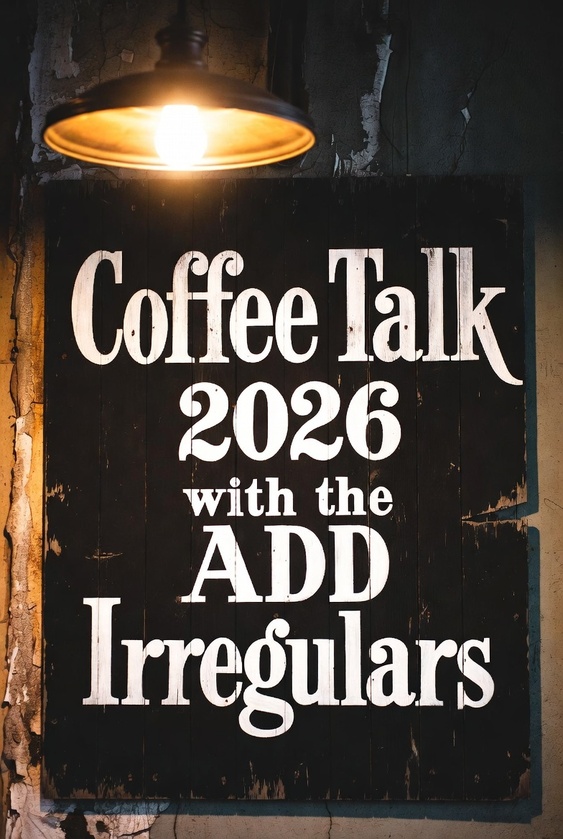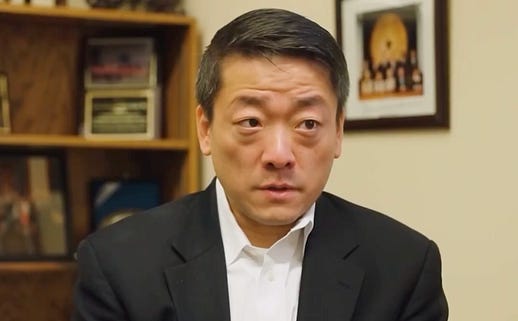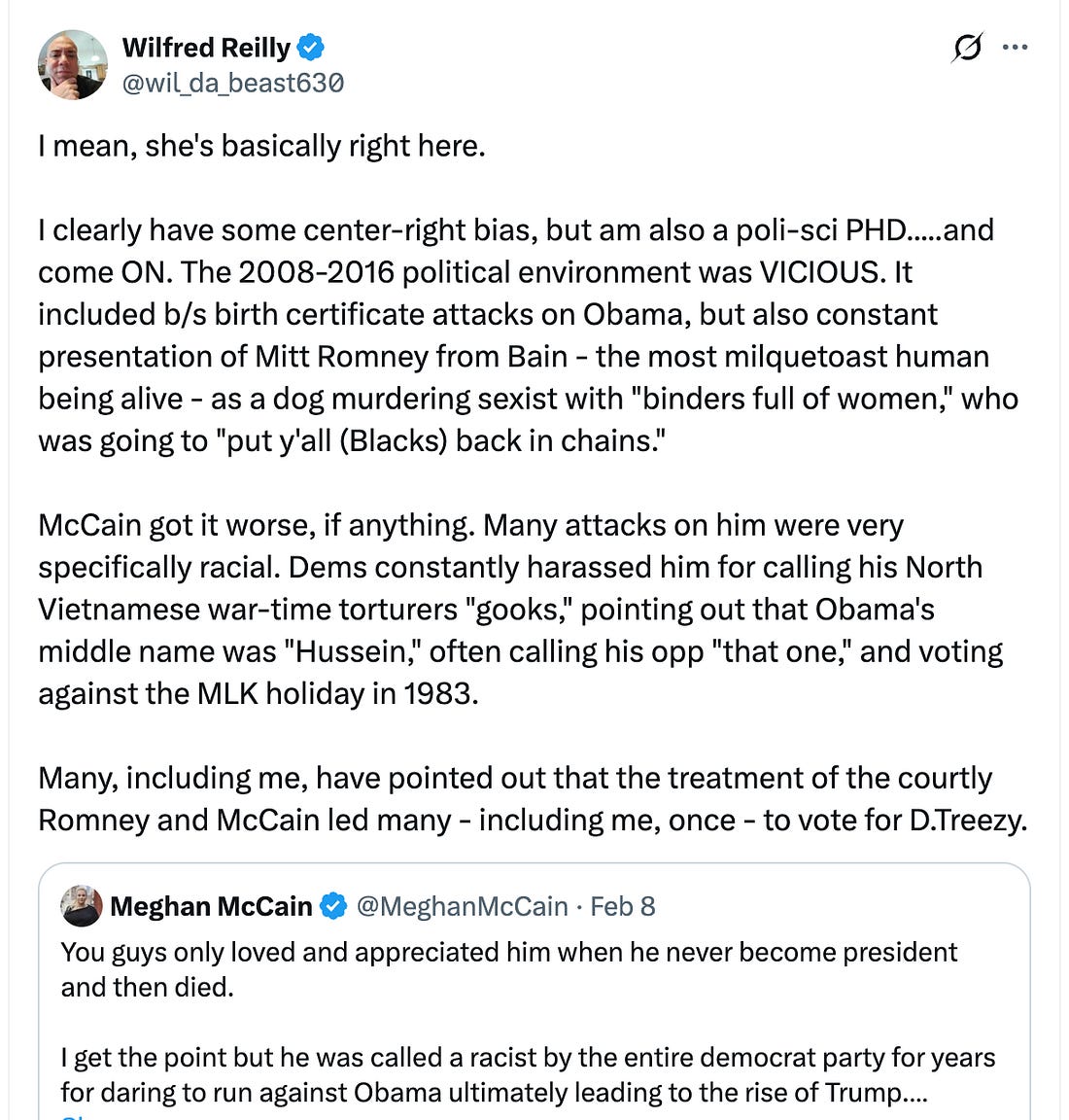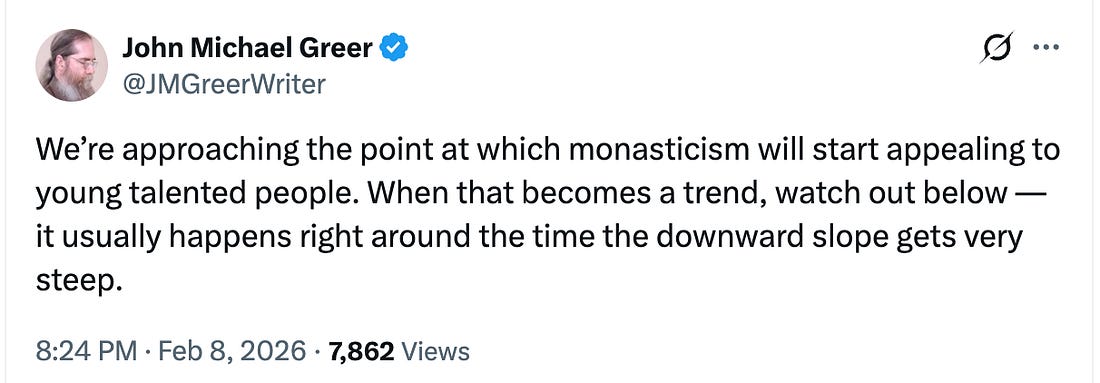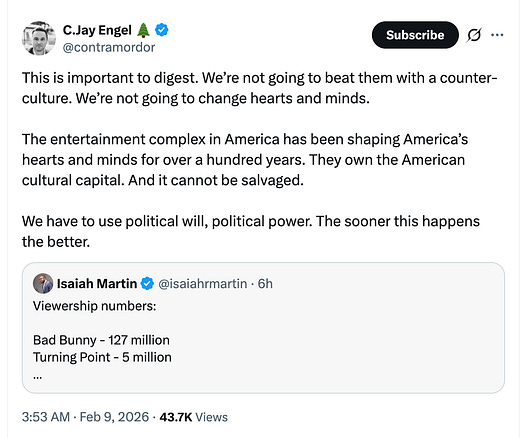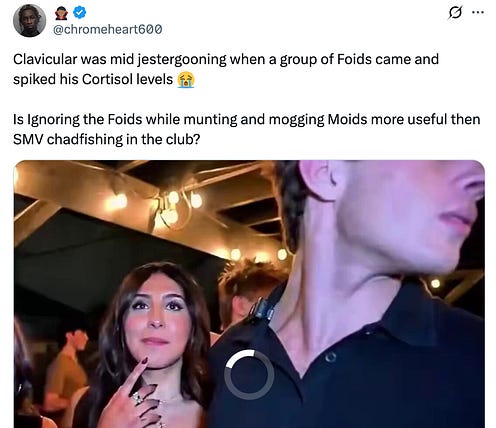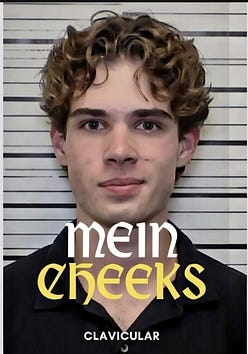Tommy The Savage
When Speaking Common Sense Is Outlawed, Only 'Outlaws' Will Dare To Speak It
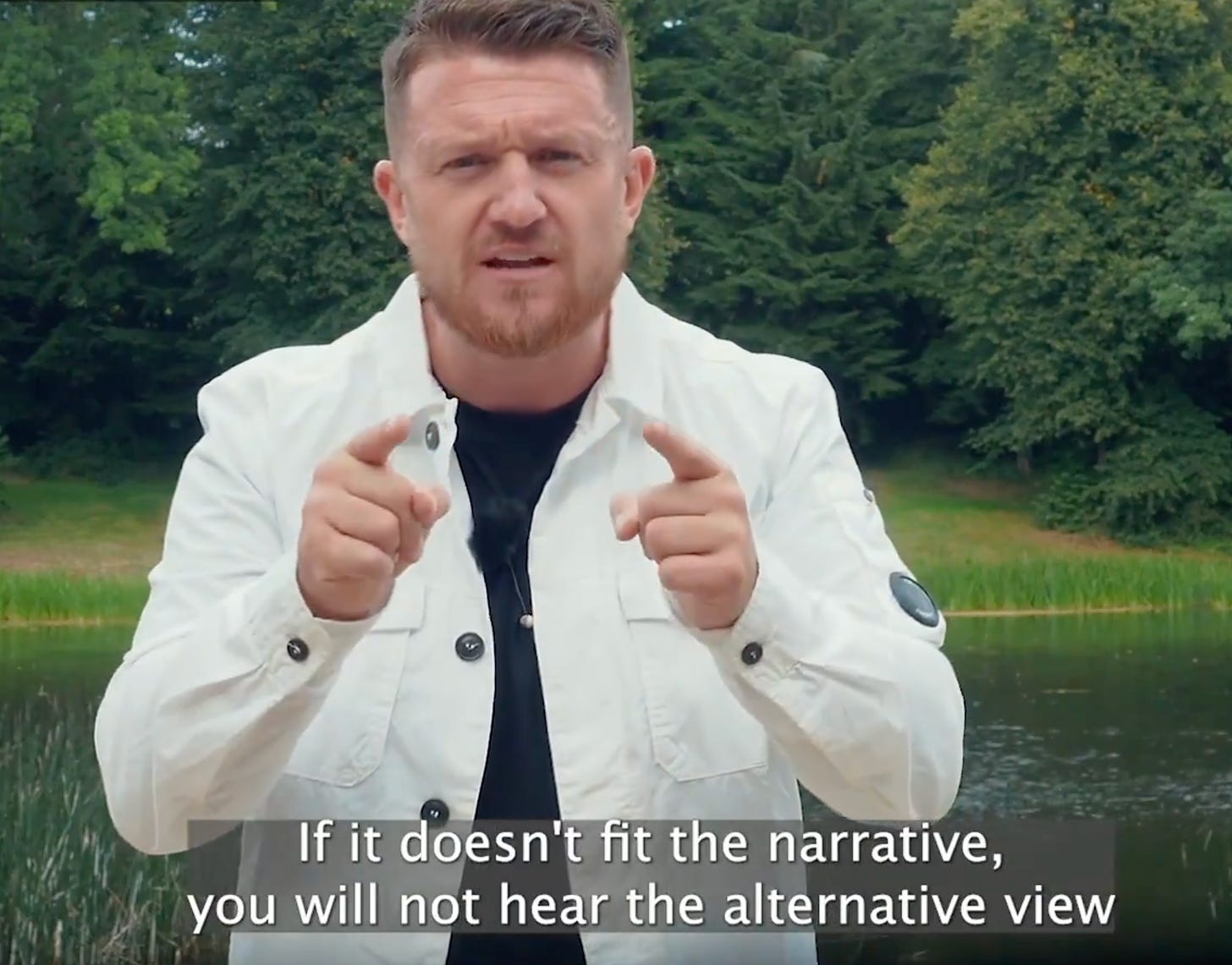
Last night I had dinner with a middle-class English couple who are in Budapest for a visit. Friends of a friend. Naturally the conversation quickly turned to the riots in their home country. At one point, I said that I had recently started listening to Tommy Robinson, someone whom I had dismissed earlier as a thug, based on his extensive history of what you might gently call “dodgy behavior.” (Seriously, look it up.)
“Did you watch the Jordan Peterson interview with him?” asked the woman.
“I saw half of it this afternoon,” I replied. “It’s shocking.”
“It is,” she said. Then she went on to say that despite the messiness of Tommy Robinson’s life and record, she supports him because he is more or less the only prominent person who is willing to stand up and say what’s happening in Britain is wrong.
“I am friends with a couple who lost their daughter for a while to a grooming gang,” the woman began. Then she told the story. I noticed that she fought back tears as she gave me the details. At one point, she struggled for words to describe what the Pakistani men had done to this 14 year old girl. The details of the deeds were too much for her to articulate. She stammered finally, “The police had to collect DNA from the child. I hope you understand what I mean.”
I did.
“In the end, the police did nothing,” the woman continued. “The poor parents, my friends, had no idea what to do. There was nowhere to turn, not if the police don’t care.”
By the end of her story, this gentle woman in her late fifties was visibly suppressing rage. I could tell that she is not the sort of person to whom rage comes easily. But there it was, and it was entirely justified by the story she had just told me. I understood perfectly well why a nice, educated, middle-class lady like her would have become a partisan of the rough working-class bruiser from Luton: because all the nice, educated, middle-class people have surrendered to the violent dispossession of the British in their own land.
It turns out that she and her husband are in Budapest looking for ways to migrate here. One of them has Hungarian ancestry, and therefore a way in. I mentioned to them that in his recent Tusvanyos address, PM Viktor Orban said that Hungary can expect a rising inflow of Europeans who want to live in a “Christian national country.”
“That’s us,” said the man.
Yesterday at The European Conservative, I published an interview with my Budapest friend Mark Bollobas, the UK-born son of two refugees from Communism, who in 2010 moved to his parents’ homeland because he saw no prospects for himself in Britain, the country of his birth. Excerpt:
[Mark Bollobas:] … I had enough of an experience in London from before, from the years I spent there studying and working, to know that it’s again a place I really probably couldn’t live as good a life as I can live here in Budapest. That includes everything: safety, public transport, religion, the feeling of culture, a sense of pride in your nation, these are things that have been eroded. So if we look now at the United States, people are not happy with the way America is. If we look at how things are in the UK, there is massive disillusionment, especially among the youth, people looking towards the future going, “Well, how am I going to survive? I just don’t know how to.”
When I was looking, more and more I began to think of Hungary. I thought of Hungary not only because I could go there, as the son of Hungarian immigrants, but also because it’s a nice place, it’s a beautiful place, it’s a kind place. And there are values there that are still important—family values. It was 2010 [the year Viktor Orbán was elected prime minister], and I knew a huge change was coming to Hungary. And I got here before it arrived. For me most of all it was a feeling of coming home, which is strange because I wasn’t born here.
It’s difficult to describe because I wasn’t brought up here, but I always felt at home here. And here, unlike in the UK, where I was always asked where I was from, here in Hungary—well, I’m obviously not from here, and I have a thick accent in Hungarian, but I’m Hungarian. I fit in and I’ve been accepted. I felt then that the U.S. was burning out while I knew in Hungary the best years were ahead of us.
Last but not least, I wanted to get married and start a family, a family based of the values and traditions I hold dear. And for that I knew I needed a Hungarian woman, whom I’m lucky enough to have found.
It is striking to me that you migrated to your ancestral homeland not looking for economic opportunity, but rather for a place that felt like home. This seems to be something that both liberal and conservative elites all over the West cannot comprehend. Why not?
Most people don’t agree with my decision because they are wearing blinders. These blinders, made in the Cold War, tell them that everything east of the former Iron Curtain is terrible, and everything west of it is wonderful. The world is nowhere near like that anymore.
I still find it strange that is a white Christian male who speaks English with a British accent that I was not welcomed into UK society. But now, having lived outside of the borders for a few years, I realize that this is the case with everyone. Either you’re a white European and you go there as a guest worker, or you go there as a person of color from a Middle Eastern country or African country, and you end up living in an atomized community or a ghetto made up of only your countrymen, paid for by the state.
I think when it comes to the sense of home and how important it is, the West has forgotten that what made the West great was its culture and its traditions. And they came to this from a position of power and wealth and success. They didn’t really need to fight to protect any of these things, because the power that came from economic power did it for them.
But as the world changed and other countries became more wealthy, and in many ways England became more poor, the UK became more poor, this skill of protecting your nation, your culture, your history, taking pride in yourself, it never came back. It never came back. I don’t know whether it’s from the schools, or whether it’s definitely in colleges, because academia is—well, it’s not very pro-British culture in any way. But even among the people it sort of disappeared. The sense of community sort of disappeared. It became much more important to make money, to be a success, to be the person you want to be. To be an individual.
Those are very, very important things to do when you’re in your twenties and thirties. But then you get to a point where you have your career, but you need a family, because family is what life is all about. After you have children, that is your droving force. And we’re now at this appalling stage where we have lots of individual success stories of people who’ve forgotten, and don’t know how, to make time for having a family. Worse yet, they’ve been educated to believe that having a family isn’t important, that you can get as much joy out of work. And that’s just not the case.
This is a really, really, really big problem. I have too many friends aged 35 to 45 who are single and lonely, who want a family, yet don’t have the skills needed to create one. Yet professionally they are all success stories. Worse yet, so many people tie materialism to happiness that when the money gets low—and globally we are all about to experience a recession—this means more and more people will become desperately unhappy as their wallets become lighter, and life becomes harder.
I’m not sure whether Hungarians know something different, I think they didn’t twenty years ago. But through a combination of luck, as well as solid political leadership, we have kept family as the most important goal in life. That’s a huge plus for us. In the early Eighties, Hungary led the world in suicides and alcoholism. And although there was Communism, almost everyone had a side hustle. Or two or three. But that has changed, those times are behind us. Now when I think of the nation that is doing terribly in similar categories, namely drug overdoses and suicides, while pushing a culture of relentless side hustles, the U.S. comes to mind.
I hasten to say that this has nothing to do with why I moved to Hungary. As you’ll recall, it had to do with personal circumstances of my divorce. I also was thrilled to move here because I think what is going on in Hungary politically and intellectually is fascinating, and important to the survival of the West. But I was not and am not alienated from America the way Mark is from Britain, in part because the ideological and cultural situation in the US, for all its problems, is not nearly as dire as in Britain.
Over the course of the evening, we talked about all kinds of things. The woman told wonderful stories about one of her ancestors, a celebrated historian remembered now for work he did to preserve a particular cultural tradition that was fading away (I’m speaking vaguely because I want to protect this couple’s privacy). On the way home last night, I thought about how she spoke with such affectionate pride in her country, and her ancestors, and what they accomplished. This I contrasted with the high emotion she had expressed earlier in the evening, thinking about the suffering of her friends whose daughter was turned for a while into a sex slave of Pakistani men, and how the police did not care to help, and how the British establishment doesn’t care either.
Then it hit me: this woman has been humiliated. Deeply humiliated. She has been humiliated by mass migration. She has been humiliated by the violence some of these migrants bring with them. She has been humiliated by the authorities, who expect people like her simply to suck it up. And she has been humiliated by a ruling class that has for some time been teaching young Britons to hate their country and their people, and to accept that their rightful place in the world is to live as second-class citizens in the land of their ancestors.
If I were her, Tommy Robinson would be my hero.
What a terrible thing, to come to late middle age, and to face the prospect that leaving your home country for a land where you don’t speak the language is possibly the most sensible thing you can do to protect yourself in old age. I mentioned to this couple the interview with Mark Bollobas, the part where Mark said that raising kids in Hungary, it is a blessing not to have to worry that his boys will be taught in school to hate their country and its people, and to think that they (the boys) might actually be girls.
She shot a glance at her husband, whom I had met on his last trip to Hungary. “It’s okay,” he told her. “He’s safe.”
It turns out she is a practicing Christian. She said she can’t understand how it is that even many of her Christian friends now accept transgenderism, not as an allowance society should make out of compassion for people who have gender dysphoria, but as a positive good that should be celebrated. The subtext of her quiet commentary was: so many of my countrymen have lost their minds, and I don’t understand what has happened to us all. That she needed assurance from her husband that it was okay to express skepticism of the trans revolution in private conversation told me something important about what it must be like to be a middle-class Briton today.
I tell you, living in Europe, and seeing more closely what mass migration has done to its countries, and also seeing the flat-out lying (either by commission or omission) done by the ruling classes of these countries (in government, media, academia, and so on), has really opened my eyes. As I’ve told you, over and over I meet people from the UK or western Europe who come to Budapest for a conference or a holiday, and hear them inevitably remark that being here reminds them of their own cities twenty or thirty years ago — before mass migration and the crime and disorder it brings had shredded the fabric of public life.
Last night I told the visiting British couple about a conversation I’d had over wine recently with a young American who had just moved here from Germany for language instruction. He told me that the difference between German cities and Budapest is striking to him. Having lived in Germany for the past two years, he said you just don’t see easygoing life on the streets like you do in Budapest. He marveled at how many people in the Hungarian capital are out and about, sitting (as we were) in a street cafe, or late at night, even young women walking to and from the clubs, not having to worry for their safety. In Germany, by contrast, he said Germans seem to have withdrawn from the public space into private life, to avoid the risk of criminal encounters with migrants or their adult children. This is especially true with German women, who run real risks just living their lives in cities where migrant men are a significant presence. And yet, he said, the Germans have neutered their own sense of self-worth, such that they seem to be under a spell that tells them they deserve what they get. How refreshing it is to be in Budapest, he said.
If you move here, I said to the couple, you will be astonished by how overwhelming, and how effective, the media propaganda is that causes people back home to think of Hungary as some kind of quasi-fascist hellhole. They laughed. The woman said that one of her relatives, hearing that they were off to Hungary for a holiday, said, “Are you going to be okay? That Orban is something of a dictator, isn’t he?”
In the future, historians may look back on this era in Western history and marvel at the psyop the ruling classes used on their nations to render peoples incapable of defending themselves and their own interests. People become self-policing, too, afraid to say commonsense things out of fear of being called evil. Are there any peoples on this earth, outside of the West, who loathe themselves as a people as much as Western liberals and progressives do?
The philosopher Matthew Crawford has a great Substack piece today in which he reveals that the UK government has long employed a psyop strategy to keep the public quiet in the face of violence that could cause them to question the dogma that Diversity Is Our Strength™. Excerpt:
One is not supposed to notice the downsides of mass immigration. In fact, such noticing has to be actively suppressed, and the present civil disorder in Britain reveals a breakdown of the UK government’s longstanding program to psychologically manage its own peoples’ response to demographic upheaval, ethnic conflict and violence.
As it happens, it was at the 2012 Olympics that these techniques were first put in place, in anticipation of a possible terrorist attack. The summer before, there had been riots across the UK that badly spooked the government, and Western leaders were watching the Arab Spring with a view to both the hazards and the opportunities for population control presented by social media. By 2019, the publication Middle East Eye was able to report that the British Home Office prepares for terrorist incidents “by pre-planning social media campaigns which are designed to appear to be a spontaneous public response to attacks.” The point, of course, is to have candlelit vigils, flowers and impromptu expressions of mutual love between “communities”, rather than riots. This story is worth telling, as it parallels the US government’s re-purposing of information warfare techniques, developed in the War in Terror, for managing internal political dissent.
Read the Crawford piece for details about this operation. He continues:
All this unrest comes in the wake of the Olympic games’ opening ceremony, in which Da Vinci’s Last Supper was repurposed as a grotesquerie of sexual unfortunates, expressing hatred of the normal and healthy disguised as defiant self-love. That is what it means to “queer” this or “queer” that (in the sense made popular by Judith Butler); it is an instinct to attack all that is settled; anything that makes feel people at home in the world. Any sense of a common culture or owned space.
In 2024, the Olympics feel like a “survival” (as the anthropologists would say) that has been turned to the purposes of what right-wingers like to call GloboHomo, that confluence of corporate-state liberationism and replacism. As Machiavelli said, a wise founder-prince will keep up the old forms, emptied of content, to make his “new modes and orders” go down more easily. As my friend Ethan put it to me, the Olympics now serve as “a remnant vector of legitimation to be exploited until it no longer means anything to anyone, just one more instance of the strip-mining of our material and symbolic order for the benefit of whatever higher interests profit, however ephemerally, from the operation.”
I believe some intuition like this, and not just the immediate issue of immigration, lies behind the rage of the Brits.
Yes, this is exactly what I encountered last night in that quiet dinner with the English couple. Migration, Islamic violence, and the hatred the British state has for its own people, dominated the conversation early on, but the bafflement the woman had over how the moral order in which she had been raised had been overthrown, and the new order accepted without protest by otherwise sensible people — this left her angry, confused, and … thinking about leaving her native land, which doesn’t feel like hers anymore.
Here is a 2022 essay that Crawford has ungated, about love of one’s own people. Excerpts:
National character grows among a people from shared experience. They speak the same language and pray to the same gods; their fathers fought in the same wars; their grandmothers tell stories that convey how one ought to feel about familiar things. They are likely to have a persistent stock of nursery rhymes and drinking songs; a repertoire of gestures, subtle facial inflections and emotional tones peculiar to them. Mutually recognizable to one another, they enjoy a form of social wealth that accumulates among inhabitants of some bounded territory that has been inhabited continuously for generations by the same people. Such an inheritance is far from universal; it is enjoyed by peoples who, often for reasons of geographical accident, have been spared conquest, colonization and dispersal long enough to form a nation, for example the “First Nations” of North America (as the indigenous tribes are called in Canada). The word “nation” shares its root with “native” and “natural”, and indeed a nation may claim an autochthonous origin for its ancestors — as though the earth itself, or rather their small part of it, were the original mother or father of their common lineage.
Crawford goes on to talk about how nationalism — political consciousness of oneself as a member of a nation, of a distinct people — is, to modern liberals, the source of all our problems. He quotes here the French political philosopher Pierre Manent describing “humanitarianism” as the successor ideology to Christianity. According to Manent, the cosmopolitan ruling class thinks that:
Peace and unity belong to the natural condition of mankind; its fragmentation into separate political bodies solicitous of their independence is the toxic fountainhead of everything that is wrong in human circumstances. Thus the right thing to do, the worthy enterprise, is to bring about the pacification and unification of humanity through the erasing or weakening of borders, the acceleration of the circulation of goods, services, information, and human beings, the fostering of an ever stronger and wider fellow-feeling among countries and peoples. Accordingly, looking at human things from the perspective of one’s own community — its common good and the peculiar content and quality of its education and way of life — is intrinsically wrong because it amounts to turning one’s back on the rest of mankind. Looking at human things … without the least preference (and even with a tad of healthy dislike) for what is ours — is intrinsically right and “progressive.” [Italics added]
And, conversely, to think and act with preference towards one’s own — that is wrong and regressive. This political psychodrama is why for some time now, the UK’s ruling-class institutions have been psyopping the British people into accepting their own displacement. This is exactly what Renaud Camus means by “the Great Replacement” — not only the replacement by foreign peoples, but the erasure of one’s own culture and history.
One more bit from Crawford:
The rise of populist movements has been fueled by a spreading recognition that this diversitarian turn, both in its moralistic expressions (humanitarianism as described by Manent) and in its material facts (mass immigration above all), is inextricably linked to an oligarchical development. Diversity is Our Strength, yes, but whose exactly? The political economy corresponding to humanitarian moralism and mass immigration is neoliberalism, an explicitly anti-national agenda for the globalization of labor markets, whether by the relocation of jobs to foreign shores or the opening of borders to foreign workers. Humanitarianism has been called “the sentimental justification of inhuman scale.”
Ethnomasochism is no psychological mystery, then. It serves a function among Western peoples as they adjust themselves -- or get adjusted -- to a post-national framework of government and economy. In such a framework, the proprietary pride of the citizen can only interfere. There are to be no citizens, only an undifferentiated mass of “human resources.”
I am reminded of Chapter 17 of Aldous Huxley’s Brave New World. If you’ve read my book Live Not By Lies, you know that I believe we have largely missed the totalitarian aspects of contemporary culture because our idea of totalitarianism has been formed by George Orwell’s Nineteen Eighty-Four. In fact, Huxley’s model of a totalitarian dystopia is closer to what we have. It’s a dystopia that achieves total peace not through violent coercion, as in Orwell, but rather by lulling everyone to sleep, symbolically, by promising them a life of constant pleasure and entertainment to drive away anxiety.
You can read the entire text of Brave New World online. Chapter 17 begins on page 99. Here is an excerpt from the dialogue between Mustapha Mond, the World Controller for Europe, and “John the Savage,” a dissident who has been raised outside the system, on an Indian reservation, reading nothing but the complete works of William Shakespeare:
[Mond:] "But industrial civilization is only possible when there's no self-denial. Self-indulgence up to the very limits imposed by hygiene and economics. Otherwise the wheels stop turning." "You'd have a reason for chastity!" said the Savage, blushing a little as he spoke the words. "But chastity means passion, chastity means neurasthenia. And passion and neurasthenia mean instability. And instability means the end of civilization. You can't have a lasting civilization without plenty of pleasant vices."
"But God's the reason for everything noble and fine and heroic. If you had a God …"
"My dear young friend," said Mustapha Mond, "civilization has absolutely no need of nobility or heroism. These things are symptoms of political inefficiency. In a properly organized society like ours, nobody has any opportunities for being noble or heroic. Conditions have got to be thoroughly unstable before the occasion can arise. Where there are wars, where there are divided allegiances, where there are temptations to be resisted, objects of love to be fought for or defended–there, obviously, nobility and heroism have some sense. But there aren't any wars nowadays. The greatest care is taken to prevent you from loving any one too much. There's no such thing as a divided allegiance; you're so conditioned that you can't help doing what you ought to do. And what you ought to do is on the whole so pleasant, so many of the natural impulses are allowed free play, that there really aren't any temptations to resist. And if ever, by some unlucky chance, anything unpleasant should somehow happen, why, there's always soma to give you a holiday from the facts. And there's always soma to calm your anger, to reconcile you to your enemies, to make you patient and long-suffering. In the past you could only accomplish these things by making a great effort and after years of hard moral training. Now, you swallow two or three half-gramme tablets, and there you are. Anybody can be virtuous now. You can carry at least half your mortality about in a bottle. Christianity without tears — that's what soma is."
The oligarchic Davos class wishes to create a utopia in which there are no nations, no borders, and the frictionless movement of people and capital. George Soros is one of the prime supporters of this vision, but by no means the only one. This is the World Economic Forum’s general view. Recall that at the WEF meeting in January, European Commission chief Ursula von der Leyen said that the No. 1 challenge facing Europe is “disinformation” — which I take her to mean in large part publicizing facts and opinions that challenge the elite worldview.
Viktor Orban has made himself hated by these elites because he has dared to notice what they’re doing, and to oppose it intelligently and effectively. Tommy Robinson is no Viktor Orban for a variety of reasons, but I see in him something similar: that the kind of courage it takes to stand against these powerful consensus-enforcers in the national and international ruling class requires a character that doesn’t always play well with others.
Why does it fall to rough men like Tommy Robinson to say the things that ordinary Britons ought to have been saying in defense of their communities? Answer: because when speaking common sense is outlawed, only outlaws will speak common sense.
Here is a link to the X page where you can watch the Robinson documentary Silenced.
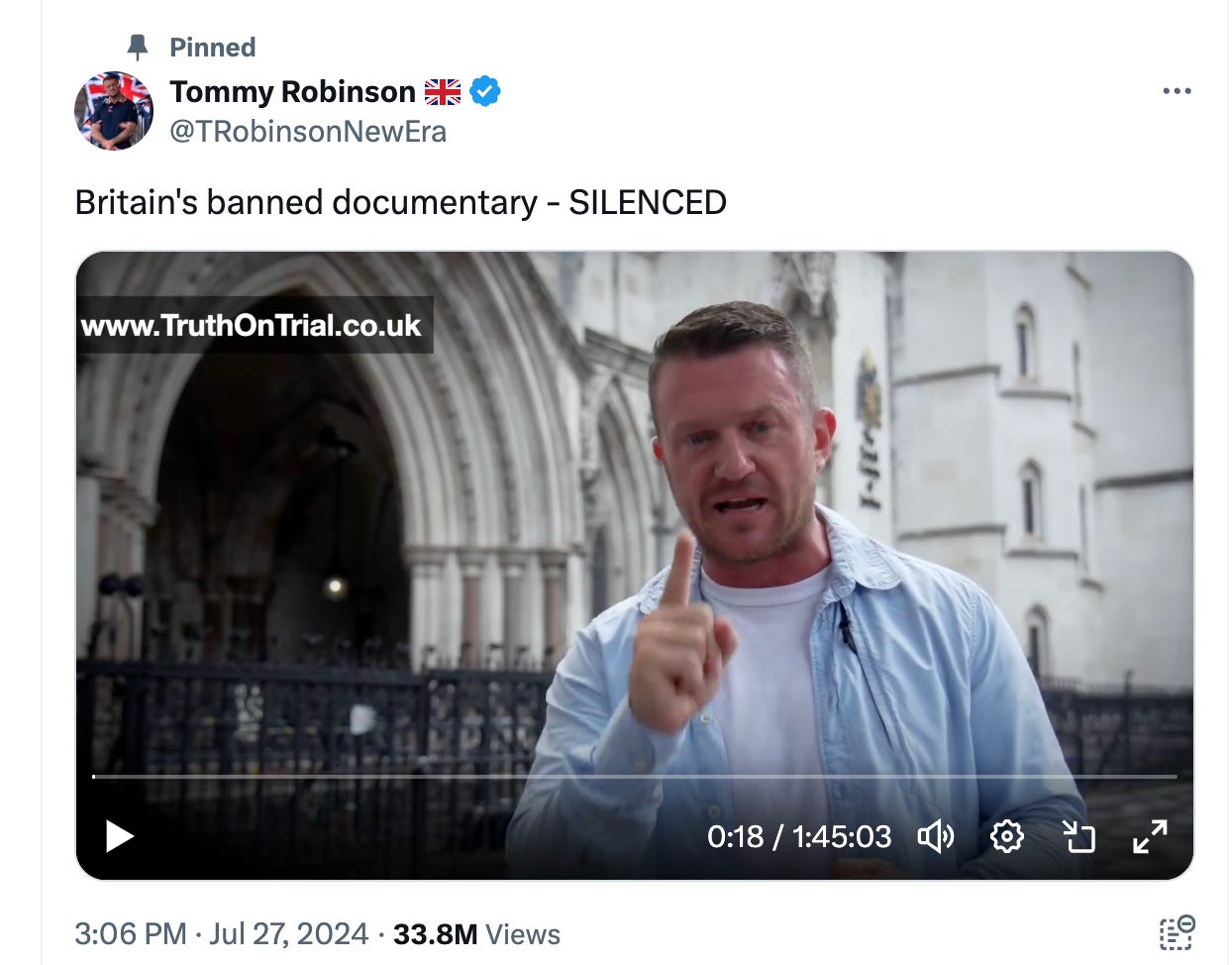
It’s well worth seeing. It details a famous case from 2021 in which Jamal, a Syrian refugee teenager, had water poured on his head in a playground incident. It got puffed up into “waterboarding,” and went viral internationally as an example of racist abuse. But it was a sham story. This kid, in fact, was a violent bully. Robinson shows how local authorities compelled teachers and others who knew what happened to sign non-disclosure agreements, and how the media, the judiciary, and the government conspired to silence the truth about the case, even though it destroyed the life of the kid falsely accused of “waterboarding” Jamal.
I think you’d have to have a heart of stone and a head of cheese not to sympathize with Tommy Robinson in all this. Is he a hot mess? You bet. Rough working-class lad. But at least in these matters of urgent justice, in which British people are being made to suffer, are being humiliated, are being dispossessed by foreigners and the actions of their own ruling class, which hates them — well, Robinson is one of the few prominent people in Britain who lives not by lies. You don’t have to agree with his politics, or make him into some kind of saint, in order to respect the hell out of him for speaking what millions know is true, but are too afraid to say.
Remember: When speaking common sense is outlawed, only outlaws will dare to speak common sense.



